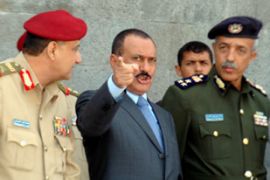Yemen rebels vow to continue fight
Houthi leader says war part of marginalisation and vows to fight on.

Al-Houthi said that the government’s claims aimed to create more fears among the Saudi government, in order to get support from its powerful neighbour to attack the people who live in the northern provinces bordering Saudi Arabia.
‘War on culture’
Al-Houthi said that his group would continue to defend itself as long as it came under attack.
“Our choice would be to defend ourselves,” he said.
“The war, the destruction and the arrests … are being waged against our culture,” he said, adding that the government had detained members of the Zaidi Shia group “on ethnic and sectarian grounds”.
| In depth | |||||||||
|
“[The war] is part of the official discrimination, marginalisation and separation practised against us as a social group described by the authorities as a minority,” he added.
Al-Houthi said his 90-year-old father, Badr Eddine, a religious figure in the Zaidi community, is on a list of 55 wanted rebels.
Hundreds have died in the latest clashes, which began when the army launched its “scorched earth” operation on August 11.
Dozens more were killed or wounded on Sunday as fighting raged in the Omran and Saada provinces of northern Yemen, military sources said.
UN agencies estimate the fighting has made a further 50,000 people homeless, mostly women and children, in addition to about 100,000 others who fled their homes during earlier rounds of the violence which began in 2004.
The Shia Zaidis are a minority in mainly Sunni Yemen, but form the majority of the population in the rugged mountainous north, where they first launched a rebellion against the government in 2004.
The authorities accuse the rebels of seeking to reinstate the imamate, a form of clerical rule that ended in a revolution in 1962, and of being backed by Iran.
The rebels deny both claims, saying that they are fighting to defend their community against what they say is government aggression and marginalisation.
